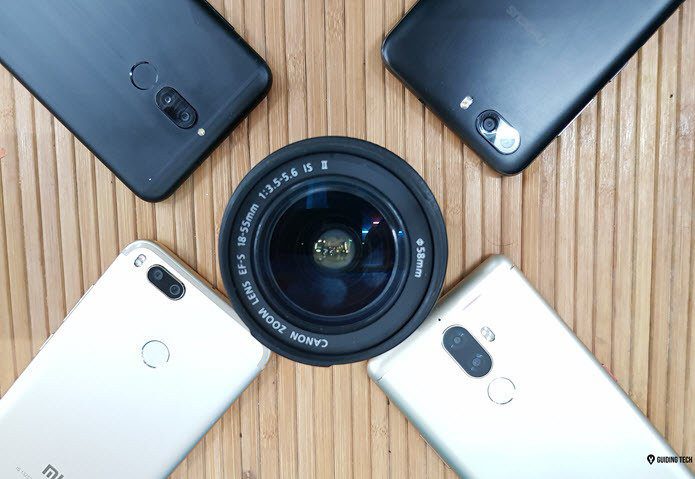Priced from Rs 10,999 onwards, the Lenovo K8 Plus is the built to address the pain points that plague the consumers these days. It’s also being touted as a complete phone by the company. So, how different is the Lenovo K8 Plus from the slightly older Lenovo K8 Note? Well, let’s find out.
Same Processor
The K8 Note is powered by a deca-core 2.3 GHz MediaTek Helio X23 chipset while the Lenovo K8 Plus is powered by the octa-core MediaTek Helio P25 which clocks at 2.6 GHz. The 10-core X23 makes the K8 Note better at handling everyday jobs and also high-graphic games. But don’t let that deter you from checking out the K8 Plus, for it’s also capable of handling everyday jobs with ease. Also, Lenovo has included a cool thermal technology in the K8 Plus to keep the device temperature down. When it comes to storage, the K8 Plus comes with 3 GB RAM and 32GB of expandable internal storage, while the K8 Note comes in two variants,
3 GB RAM with 32 GB of internal storage4 GB RAM with 64GB of internal storage
The War of the Dual Cameras
The K8 Plus sports a dual-camera setup on the rear with 13-MP PureCel Plus sensor and a 5-MP depth sensor. Both these combine to produce DSLR-like bokeh effect that is common in all the recent dual camera phones. The K8 Plus dual camera are a tad advanced with Largan precision lenses on both the cameras. The Lenovo K8 Note also comes packed with a dual camera setup comprising of a 13-MP and 5-MP lens. The difference lies in the selfie snapper. The new Lenovo K8 Note has a selfie shooter of 13-MP while the K8 Plus sports an 8-MP front camera with f/2.0 five element lens. Also, the K8 Plus boasts of an 84-degree wide angle mode meant to capture the bigger selfies. Both the phones come bundled with Party Flash aka front flash, so as to help you take awesome selfies even in low light conditions. Other than that, the Lenovo K8 Plus camera has added features like beauty mode, depth mode, pro mode and focus shift for the dual camera.
A Tad Smaller Display
Both the Lenovo K8 Plus and the K8 Note sports Full HD IPS display protected by Corning Gorilla Glass. The key difference is in the form of size. The K8 Note is a tad bigger at 5.5-inch, while the new Lenovo K8 Plus features a 5.2-inch display. The Oleophobic coating also makes a comeback in the K8 Plus. This coating acts as an anti-fingerprint coating built to make the phone screen smudge-roof.
A L’il Similar Design
The Lenovo K8 Plus shares the same look as the K8 Note — metal body, fingerprint sensor and vertical dual camera setting at the at the rear. Even the music key which made its debut in the K8 Note is featured in the K8 Plus. The Lenovo K8 Plus also comes with a unique SIM Tray which can house both the SIMs and a microSD card, like the Moto G5 Plus. On the other hand, the K8 Note comes bundled with a Hybrid SIM tray and a dedicated tray for the memory card.
Battery Stays the Same
When it comes to the battery specs, both the devices are powered by a huge 4,000 mAh battery unit which is charged via a 15-watt turbo charger. Both the phones sports a slew of battery related features to boasts of, including 13 hours of web browsing, 100 hours of music playback (via headphones and screen turned off) and 20 hours of video playback.
Price
Price is one of the important factors when it comes to buying a phone. The Lenovo K8 Plus is priced at Rs 10,999 while the Lenovo K8 Note comes with a price tag of Rs 12,999 for the 3 GB RAM/32 GB variant and Rs 13,999 for 4GB RAM/64GB variant.
Which is the Better Bet?
The Lenovo K8 Note Features a better processor, slightly bigger display and an increased internal storage, all for an additional three thousand bucks. As for the software version, both the phones run on stock Android Nougat 7.1.1. So, if you are looking for a secondary phone with decent specs and a good camera, the Lenovo K8 Plus seems a good choice. But if you can stretch the budget a little (better specs, remember?), the Lenovo K8 Note will be your best bet. See Next: 7 Incredible Xiaomi Mi A1 Features That You Should Know The above article may contain affiliate links which help support Guiding Tech. However, it does not affect our editorial integrity. The content remains unbiased and authentic.












